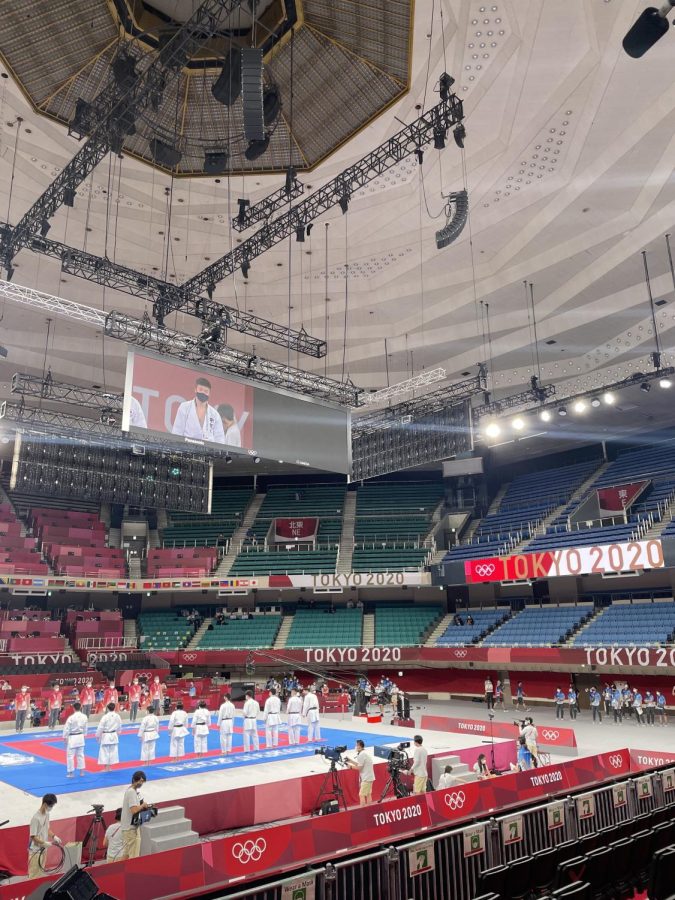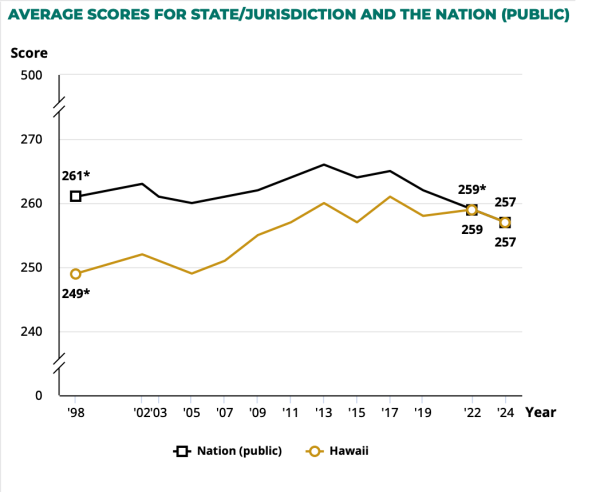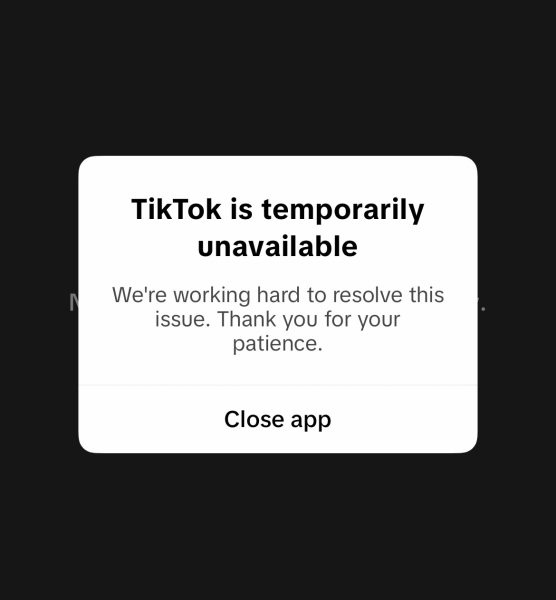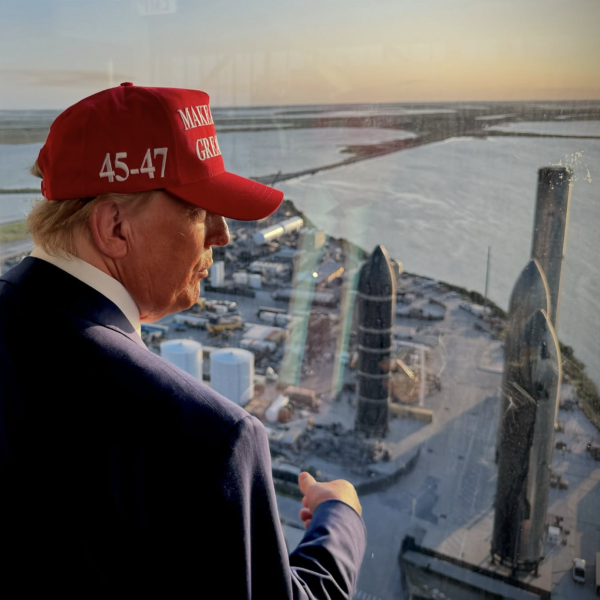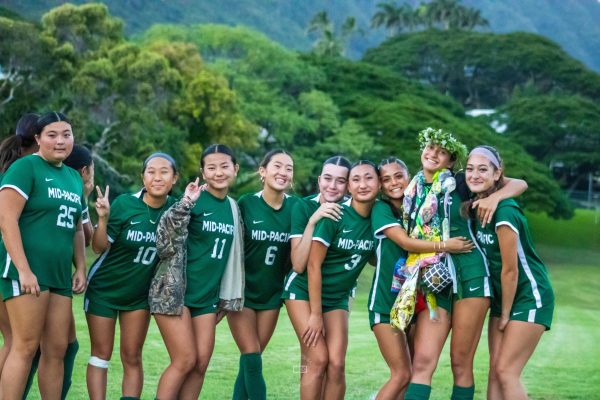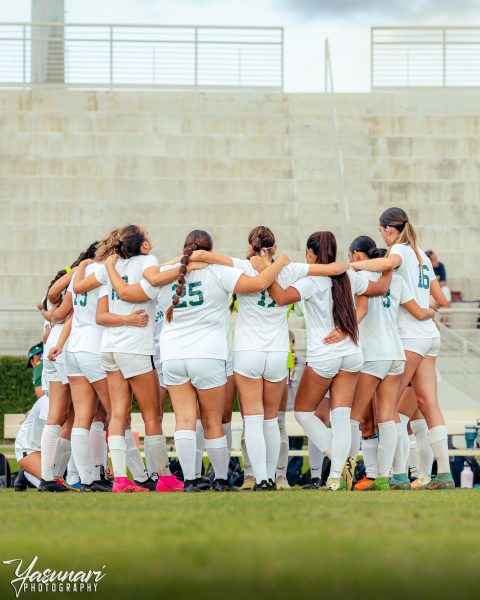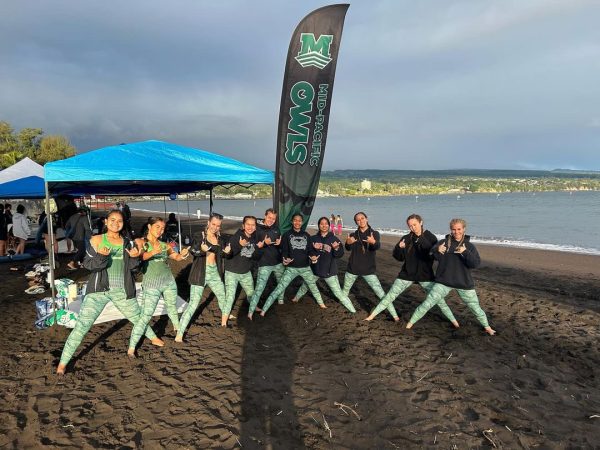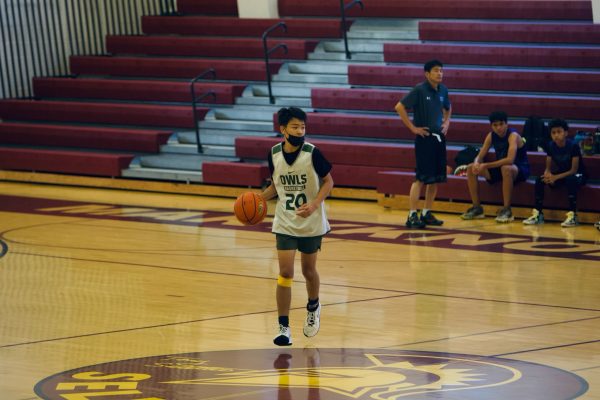Mid-Pacific alumni work behind the scenes during the Olympics
This past summer the Olympics were held in Tokyo, Japan after being canceled in 2020. Mid-Pacific, Yoshi Sasakawa ʻ07 helped host karate events.
Mid Pacific graduate, Yoshi Sasakawa ‘07 stands in the arena where Olympic Karate events were held. This past summer the Olympics occurred in Tokyo, Japan after being postponed in 2020.
By Kamm Kojima, Staff Writer
October 27, 2021
In early August, skateboarding, surfing, sport climbing, and karate debuted at the Summer Olympics. Images of athletes who competed in these sports were televised all around the world. However, most don’t know what goes on behind the scenes.
Before the Olympics began, Yoshi Sasakawa, ‘07 English Learning Development student and Board of Trustee member, helped form karate as an official Olympic sport.
“When it came all together, I didn’t know what to say. It was just amazing that we actually had it because, at a certain point, I’m not going to lie, I thought it was going to be canceled,” said Sasakawa.
Franklin “Tripp” Tokioka, senior and former karate athlete, appreciated that a Mid-Pacific alumnus helped to normalize non-western sports.
“A lot of people will sort of become more accepting and be sort of curious about other sports out there, besides more western sports. I think people over time will become aware of non-western sports, and I ultimately think it’s a good thing,” said Tokioka.
With karate now an official Olympic sport, Sasakwa’s responsibility was to help host karate. He arranged temporary residence for athletes from around 200 countries.
“When you have all these athletes coming in [from] about 200 countries, you [athletes] need a visa, you need to arrange where they want to stay in the Olympic Village, but some countries have a little more budget than others, so they’re like ‘I don’t want to stay in the athlete village, I want to stay in a four-star hotel,’ so we have to arrange that,” said Sasakawa.
However, due to COVID-19, the Tokyo Summer 2020 Olympics was canceled. Sasakawa, also Vice President of Media Relations for Japan Karate Federation, said it was challenging trying to handle the media as the Olympics was in the news daily.
“The hardest part was fighting against the negativity that we had against the media and the public,” said Sasakawa.
When the announcement came out that Tokyo Olympics 2021 was scheduled, he and his team had to regroup.
“We had to really, pretty much go to ground zero. Why are we doing this again? What’s the purpose?” said Sasakawa.
Most volunteers were trained virtually.
“There was a lot of logistics to it, and they were all very, very organized. They did a lot of training for it onsite, online now with COVID-19, so they didn’t have too much in-person training,” said Trent Yamada ‘07, volunteer for karate.
On Aug. 4, 2021, volunteers, organizers and athletes were a part of karate’s debut in the Olympics.
“That was just amazing, I mean, of course being at the first time of any sport, I’m sure the participants or the karate people were very, very, stoked to be there. They have been training their whole lives for that very moment, so being able to be part of that was just a dream,” said Yamada.
Once the Olympics began, Sasakawa said his job became easier, but it was difficult to find work for their volunteers to help with.
“We had all these volunteers who were supposed to handle 20,000 people [per day], and they had nothing to do,” said Sasakawa.
Volunteers like Yamada were tasked to regulate who had access to watch from the stands. Even though there weren’t that many people, he said he was grateful for the opportunity.
“I didn’t feel bored or anything. I was just really appreciative to have been able to join this, be part of the Olympics,” said Yamada.
Watching karate unfold before his eyes, Yamada witnessed the energy in the gymnasium.
“Even without spectators in the stands, you could sense just the intensity of the competitiveness of the athletes and even the coaches in the stands. They just have so much passion. They want to see their athletes win, and you could really, really feel that emulating from the crowd. I couldn’t even imagine if the stands were full, that would have been insane,” said Yamada.
Although Sasakawa could not earn a medal, his experience in organizing such a huge event gave him the strength to believe that he could do anything.
“It was a very, very, very difficult project that got extended, which made the difficulty even worse. It’s mentally draining, but since I went through this, I feel like I can do anything at this point,” said Sasakawa.

